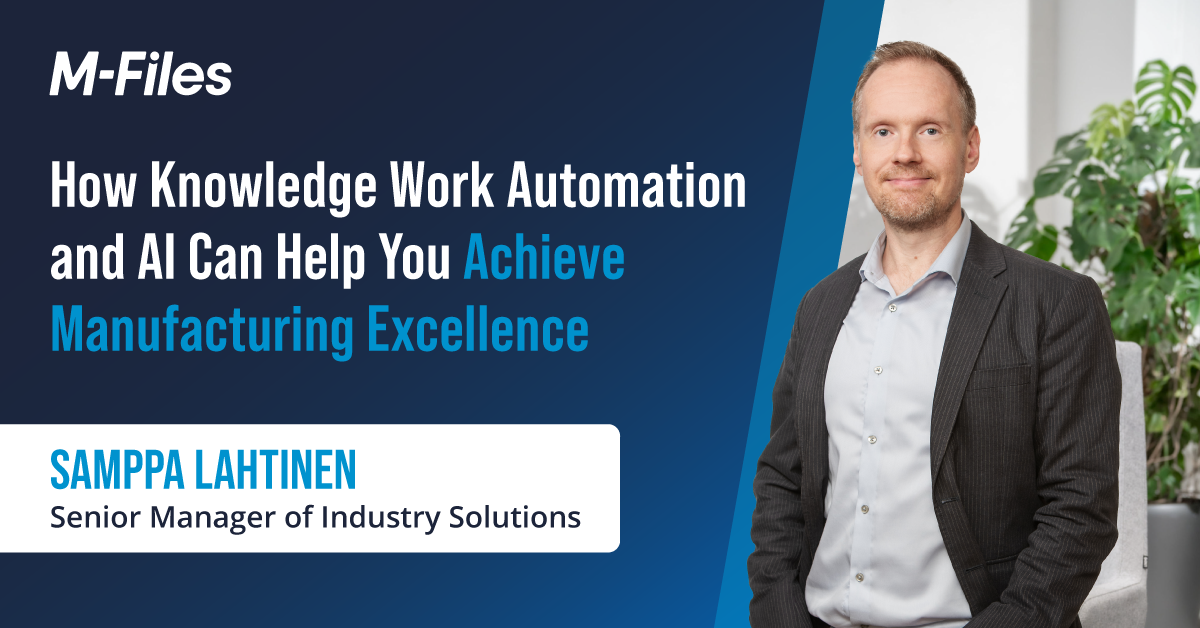Achieve Manufacturing Excellence with AI
How Knowledge Work Automation and AI Can Help You Achieve Manufacturing Excellence

By: Samppa Lahtinen, Senior Industry Solutions Manager
Increasing growth and profitability in competitive markets require solid execution of plans and strategies. That execution, however, is often hindered by inefficient manual processes, fragmented information management, and limited ability to enforce quality and compliance controls. To achieve operational excellence, manufacturers need to establish a digital backbone spanning across departments, systems, and processes. Leveraging new technologies such as AI (artificial intelligence), machine learning, and modern ERP systems is a key innovation driving process automation in smart manufacturing. Having transparency and control over data allows for the systematic improvement of processes, leading to better flow, and reduced response times, errors, and risks. This challenge can be addressed with a comprehensive knowledge work automation platform.
Who are Knowledge Workers and What is Knowledge Work Automation?
Knowledge workers in manufacturing are individuals who primarily deal with information, data, and intellectual tasks rather than manual labor. They use their expertise and analytical skills to solve complex problems, improve processes, and drive innovation. Examples of knowledge workers in the manufacturing sector include engineers, data analysts, quality control specialists, IT professionals, research and development scientists, and supply chain managers. These roles are often involved in optimizing business processes and implementing process automations to improve efficiency and achieve organizational goals.
Knowledge Work Automation (KWA) refers to the automation of manual tasks in knowledge work, reducing repetitive tasks to enhance productivity and allowing professionals to focus on value-adding activities. It leverages technology, such as AI, to automate processes and improve efficiency and quality of work.
How Can M-Files Help Manufacturing Firms Achieve Organizational Excellence?
M-Files is a knowledge work automation platform that offers document management, automated workflows, and robust permission management. It provides software solutions that integrate business objects and connect with ERP and CRM systems, providing business process automation while eliminating information chaos and enhancing process accuracy. By unifying enterprise data and providing personalized views, M-Files streamlines information management, reduces errors, and boosts operational efficiency, making it a powerful tool for modern manufacturing organizations.
Generative AI is revolutionizing the manufacturing industry by addressing key challenges and driving efficiency. The transformative impact of AI agents is evident as they streamline industrial operations, necessitating manufacturers to adapt to the rapidly evolving technological landscape. With labor shortages, rising costs, and changing customer demands, AI-driven, near-autonomous systems have become essential. AI agents, both virtual and embodied, play crucial roles in enhancing operational efficiency and flexibility. Adopting a value-driven approach to technology is vital, supported by strong organizational foundations. Embracing frontier technologies like M-Files Aino ensures manufacturers secure a competitive advantage in the future. M-Files Aino uses AI to automate tasks, improve process efficiency, and ensure data security while Hubshare provides customizable workspaces for seamless collaboration and centralized information access, which boosts productivity and innovation.
Overcoming Key Challenges in Manufacturing and Intelligent Information Management With M-Files
In today's competitive market, growth and profitability hinge on flawless execution. However, many manufacturers face significant challenges:
- Information Fragmentation: Information scattered across various systems and departments leads to inefficiencies. Employees struggle to find the right information, deal with access control issues, and face confusion due to duplicates and inconsistent folder structures.
Solution: Eliminate information chaos with enterprise search and automation. By unifying visibility to enterprise data, automating document management, and providing personalized views, you can streamline information management processes to enhance efficiency.
- Manual Processes: Reliance on slow, error-prone manual processes reduces operational effectiveness.
Solution: Improve efficiency and accuracy with workflow automation that helps automate business processes. Automating workflows ensure timely task completion, increases information accuracy, and integrates external collaboration seamlessly.
- Quality and Compliance: Manual application of document access and sharing rules can lead to breakdowns in audit trails. For example, automating the accounts payable process can ensure smoother transitions and better training for staff.
Solution: Reduce business risk with automated controls and audit trails. Automate permissions based on document type or process phase, include quality and compliance controls in daily workflows, and establish a single source of truth.
Key Trends in Manufacturing and How M-Files Solves Manufacturing Inefficiencies with Intelligent Automation
The manufacturing sector faces several challenges, including supply chain disruptions, the rise of smart factories, a growing emphasis on sustainability, and talent obstacles.
- Supply Chain Disruptions: Prolonged lead times for critical production materials necessitate robust solutions for operational continuity and inventory management.
Solution: M-Files ensures operational continuity by centralizing critical documents and data, enabling quick responses to disruptions with automated workflows and real-time data visibility. Industry leaders have adopted real-time data analytics and workflow automation to identify inefficiencies and maintain operational continuity despite supply chain disruptions.
- Smart Factories: Digital transformation is essential for efficient and agile production processes and overall manufacturing operations.
Solution: M-Files supports digital transformation by integrating advanced technologies and intelligent information management into workflows, optimizing logistics, and streamlining tasks for greater efficiency and agility.
- Sustainability: Manufacturers strive to reduce their environmental impact while maintaining profitability, requiring meticulous documentation and compliance.
Solution: M-Files promotes sustainability through paperless operations and meticulous documentation, ensuring compliance with environmental regulations and reducing the environmental footprint.
- Talent Obstacles: Attracting and retaining skilled workers is crucial as technology advances.
Solution: M-Files enhances the work environment by automating manual processes with AI-powered systems, improving productivity, and providing robust training and onboarding capabilities to attract and retain skilled workers. Automation also helps meet the needs of customers and improves business operations.
What's Next for AI in Manufacturing?
In the quest for manufacturing excellence, leveraging Knowledge Work Automation (KWA) and AI is crucial. M-Files stands out as a comprehensive solution, addressing key challenges such as information fragmentation, manual processes, and compliance issues. By centralizing data, automating workflows, and ensuring robust permission management, M-Files enhances operational efficiency and accuracy. Additionally, it supports digital transformation, promotes sustainability, and helps attract and retain skilled talent. As manufacturers navigate supply chain disruptions, the rise of smart factories, and the growing emphasis on sustainability, M-Files provides the digital backbone needed to achieve operational excellence and drive growth and profitability in competitive markets.









